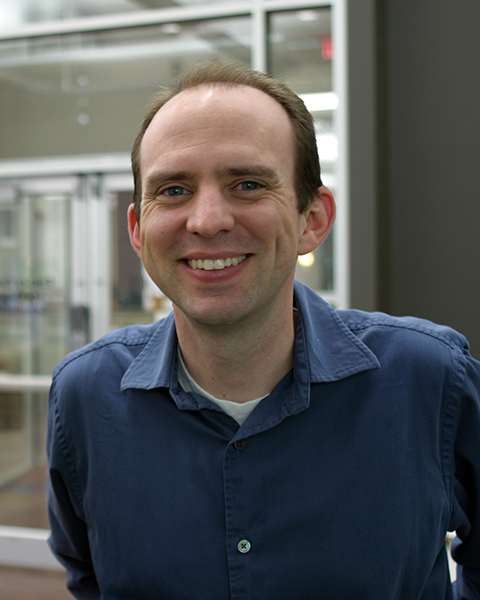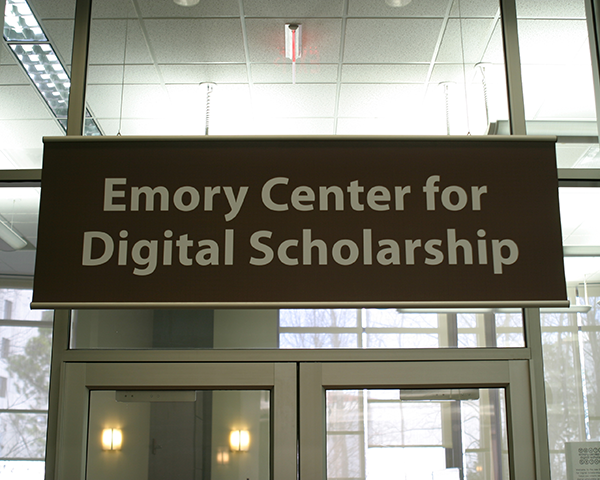Since the OIT and Library divisions were joined together to form LITS, I began to ask myself “Why?” I’ve heard it said that the library of the future will look more like an Apple store. It’s all just information. But to find out more about how we envision information intersecting with technology at Emory, I went to talk with Brian Croxall, the Digital Humanities Strategist in the newly formed Emory Center for Digital Scholarship, who I had already been following on Twitter.
MK: So Brian, tell me about all these changes.
BC: Well, DiSC doesn’t really exist anymore. DiSC was the Digital Scholarship Commons, and it was a tenant in the Research Commons area of the Library. On June 1st the Emory Center for Digital Scholarship was created. That took four units: DiSC, ECIT, the Beck Center, and the electronic data center from the library have been combined into the Center for Digital Scholarship with Allen Tullos and Wayne Morse co-directing.
MK: Do you think we’ll do more assisting faculty with digital identity and their own online presence, and that sort of thing, since ECIT wasn’t so much focused on that area?
BC: That’s something that we continue to get questions about. We did a workshop recently about online identity. I fielded an email from a faculty member in Women’s Studies just recently about it, and today I got an email from a grad student in psychology. It is definitely a part of what we want to think about. Even questions like helping undergraduates think about digital identity. And in this way we’ve been helping in the “Domain of One’s Own” project. But I’ve found in my own experience in the last three years working here that it’s hard to convince undergraduates to be interested in concepts of online identity, because to them, for most of them that means Facebook privacy, and they’re all convinced they’re doing it right.
MK: (Laughs)
BC: So, yes, there are large questions floating around about what do we do with digital identity — how can we help people be thoughtful when creating their digital identity?
MK: I think also beyond that it would be important to look at digital publishing and the changes there and how your digital or online identity relates to that or connects with that. That your success in kind of a new era of publishing may also be directly related to how successful you are online in general.
BC: Yes.
MK: So I would imagine it would have to become important in some of that at least, some faculty probably becoming more successful publicly through online methods than others. What are the implications of that?
BC: I think it really matters for graduate students and junior faculty. For graduate students, if you’re on a job talk, you’re going to get Googled. I’ve seen it myself any time I’ve applied for jobs in the past. People want to find you. And it is important for people who are starting their careers. I think it’s less critical for a tenured professor or an endowed chair. They’ve clearly already succeeded in some measures of the academic world. And they may not be quite as concerned with those things. So, I hesitate to say everyone needs to be online. Because that’s not totally true. But it makes for a lot more opportunities to have your work be known and to practice engaging in dialogue with others.
MK: I’ve seen the same thing just within IT. That there can be someone doing a job very similar to somebody else, but they can become a respected online voice in their own global circle on that subject or whatever other subjects they’re interested in, which can really change the relevancy of who they are to the organization as well.
BC: Another sort of function of this center, to help think about digital publishing, is this area over here where Southern Spaces is working. They are going to be in some ways a model for ongoing large project work flow and for how digital publication gets done. How do we make journals? How do we deal with questions like peer review? Faculty are always interested in starting journals. And It’s not really hard anymore! Publication is push-button easy, and attention is the scarcity, and that’s where the online identity becomes important regarding how you drive people to your content.
MK: So how do your projects come about? I’m interested in how Digital Humanities might be an area that is somehow separate from the Humanities, and the projects that are born within this group or what you’re doing here vs the projects that are born within the departments themselves. Where will that go in the future? Will there really be such a thing as Digital Humanities 20 years from now, or is it really just Humanities that happen to be digital?
BC: Yeah, that’s something that people like to say a lot. In fact, I’ve said it in the past. What I think right now, is that Digital Humanities…I have a whole lecture about this. The phrase “Digital Humanities” sort of rises about 2004. And, for the past five or six years, it stood for a number of different things. The term prior to 2004 was “computational humanities” or “humanities computing.” I think in some ways that was a better phrase because it points to what Digital Humanities I think will eventually become which is just a particular method. So in English or Art History people might have a Marxist approach or a Feminist approach, or mix the two.
MK: Sure.
BC: I think 20 years from now, alongside those we’ll also have people that are also taking computational approaches. So the ideal is not that we have a separate department of Digital Humanities. In fact, the historical approach to Humanities Computing or Digital Humanities will probably differ some from the English approach. But I expect to see it in departments, just faculty members doing things. And then, where the difference does exist, is to this point — It is a very rare person who has the ability to do everything by his or her self. Even people who are chaired faculty members of Digital Humanities and have both the subject expertise in say English or Drama or whatever AND have the technical background where they can program — They don’t do things by themselves, they do things in teams or groups of others.
MK: Right, right.
BC: And so, from my perspective, something like Emory Center for Digital Scholarship will be a place where it’s a resource, it’s part of the team that faculty members are looking to and drawing on to get work done, that is answering a very particular humanistic question. Although, it’s worth saying that this isn’t the Emory Center for Digital Humanities, but Digital Scholarship. So, the desire is to not be only focused only on humanities but to be looking at the Social Sciences and even the Sciences, how we can help out.
MK: Not much different than the role OIT has had with its customers.
BC: The way projects have worked and are going to work here is an evolving thing. Some of our projects have come from faculty. But we also have had proposals come from grad students, from librarians. One of the projects I’m managing came from one of our software developers, who happens to have her PhD in English as well. We’re hoping to have things happen where faculty members or grad students say, “You know I’ve got this idea… Wouldn’t be cool if I could do x or y…”
MK: That sounds really great Brian. What interests me, learning about Digital Humanities and what’s going on there, is seeing that people who are interested in the humanities are discovering these technological tools, whether it be APIs and data-mining or even just simple word-clouds, to help them get closer to their goal; where at the same time you have highly technical people who are playing around with exactly the same types of technical tools and inadvertently discovering things about humanity.
And that’s how I see it in the end, this merger of OIT and the Libraries at Emory. We’ve really been coming at things from opposite directions, but ending up at the same place, and yet not even realizing (until now!) that the other group is there.


